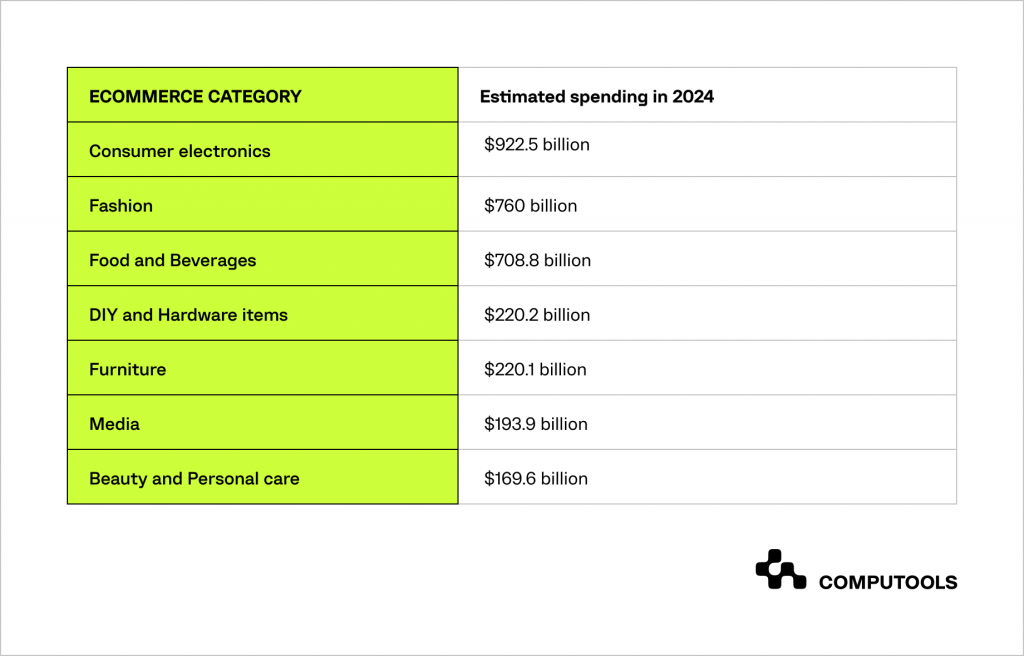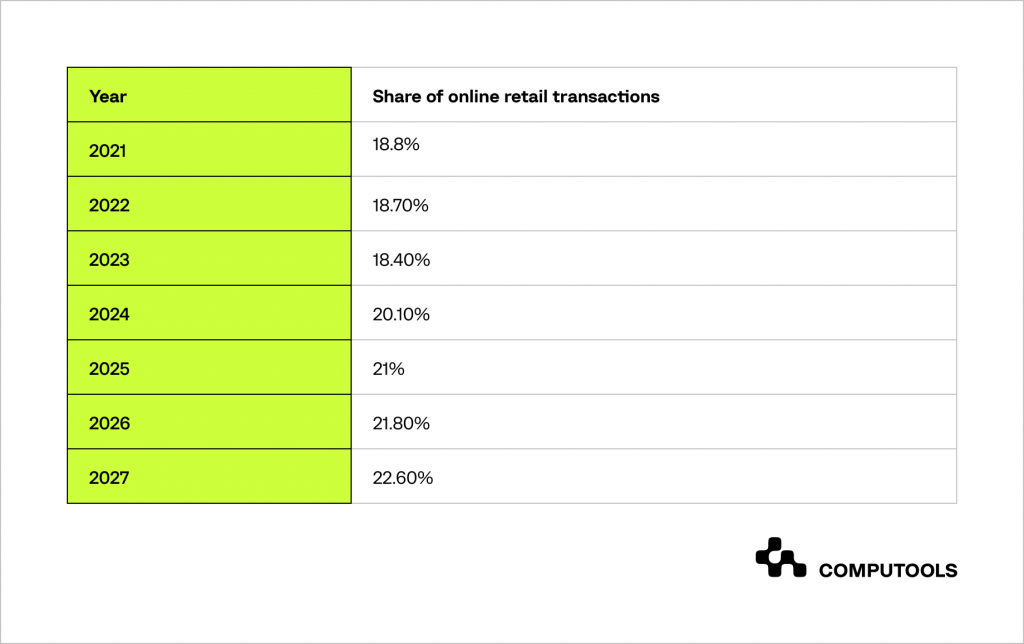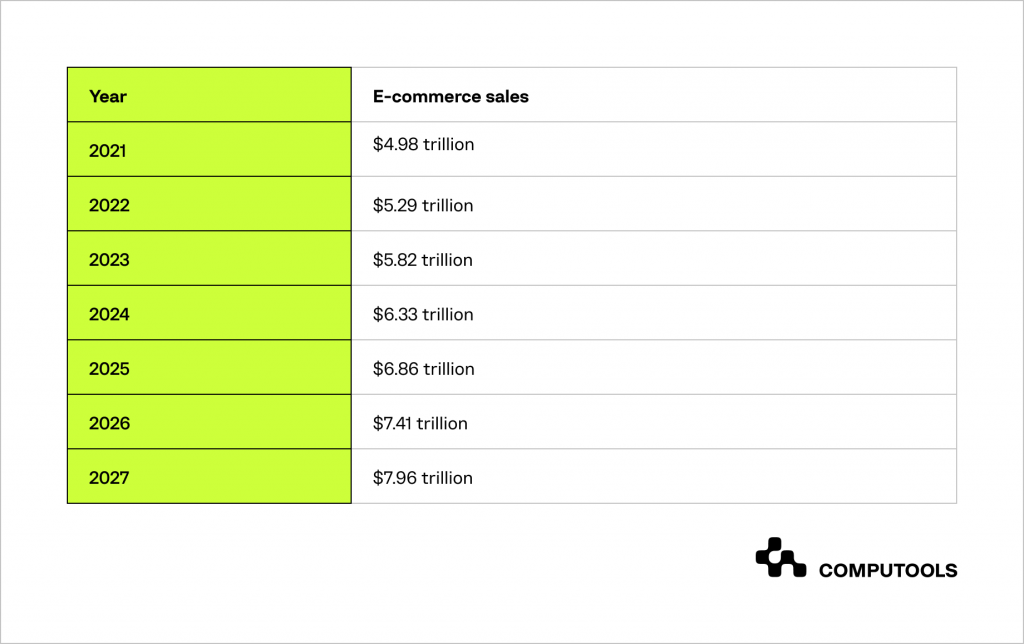E-commerce software development services for business have become a goldmine in the retail and wholesale industry in recent years. We’ve compiled some of the juiciest statistics for you to see for yourself in numbers what this industry is capable of. We used Statista and Shopify research.
The following table illustrates the rise of retail e-commerce sales over time, worldwide:

The percentage of online retail transactions is displayed in the following table:

In 2024 consumers spend mostly on:

If you want to make your business a part of such a rapidly growing ecosystem, you should consider integrating e-commerce software. But first, read this article to the end to learn all about e-commerce integration, its pros, pitfalls, and nuances that can affect the overall process.
What is E-commerce Integration?
Let’s first explore what “integration” means. This term, short for “data integration,” refers to the systematic process of compiling data that was previously stored in several sources into a single, consolidated source. Once compiled, you can access the data as one clear, easily understood stream of aggregated information.
E-commerce integration refers to the ongoing, dynamic relationship between your business’s front-end website and its back-end systems like Enterprise Resource Planning (ERP) and Customer Relationship Management (CRM) systems.
This integration ensures that information continuously flows in and out of your company to keep your e-commerce operations running smoothly.
The coordination between the front-end and back-end components ensures that data is constantly updated and synchronised. This prevents your business from experiencing bottlenecks in operations. It’s important to note that e-commerce integrations are not the same as e-commerce interfacing.
The distinction is straightforward:
• E-commerce Integration is when all relevant business data is consolidated into a centralised system where it becomes accessible for various functions.
• E-commerce Interfacing is when data is stored and managed across multiple independent systems. The data is then duplicated and harmonised through interfaces before it becomes available for use, which adds extra steps to the process.
By building retail software development, alongside leveraging advanced e-commerce data solutions, you can enhance your operational efficiency and deliver personalised experiences that resonate with your customers.
Components of E-commerce Integration
Different sorts of ecommerce platform connectors can help your business in a number of ways:
1. Website Development Solutions: Solutions for building websites form the foundation of your online business. Platforms like BigCommerce and PrestaShop enable you to create, manage, and monitor your business operations effectively.
For instance, a retail business using BigCommerce can quickly set up a customisable online store, allowing for seamless integration with various payment and shipping options, which helps enhance user experience and drive sales.
2. Customer Relationship Management (CRM): CRM systems like HubSpot or Zoho CRM track every interaction and store essential customer information, helping to establish strong customer relationships.
For example, a small business using HubSpot can automate follow-up emails after purchases, providing personalised recommendations based on previous customer behavior, which enhances customer loyalty.
3. Payment gateway integration: Payment gateways like Square or Authorize.NET manage orders and billing. By centralising consumer purchase information and transaction status, this integration offers post-purchase feedback survey options.
For example, a subscription service using Square can easily manage recurring billing and send surveys to customers post-purchase, allowing for valuable insights into customer satisfaction and areas for improvement.
4. Customer support management: Management of customer service, such as such as Zendesk or Freshdesk, respond promptly to client concerns. An e-commerce store using Zendesk can streamline customer inquiries across multiple channels (email, chat, social media) and use AI to automate responses to common questions, enhancing overall customer satisfaction.
5. Email marketing solutions: Integrated e-commerce solutions for email marketing are still a wonderful way to interact with clients when certain events happen. A seasonal business, for instance, might use Mailchimp to send out tailored emails offering deals and discounts over the holidays, which would boost sales and enhance customer interaction.
6. SMS marketing tools: Tools for SMS marketing text consumers where they wish to be reached. You may send customised SMS and interact with clients through surveys or referral codes by using tools like Klaviyo or Gorgias.
For instance, a restaurant can utilise SimpleTexting to send personalised SMS promotions for new menu items or special discounts, fostering customer engagement and driving foot traffic.
7. Experience Management Solutions: E-commerce software development solutions for experience management give you significant details about how customers feel about your brand during their interaction with it.
For example, a travel agency utilising Qualtrics can gather feedback after trips to analyse customer experiences and improve services based on real-time data, ensuring they meet customer expectations and enhance brand loyalty.
Benefits of E-commerce System for Your Business
An integrated e-commerce system offers numerous advantages that can significantly enhance your operations and drive growth:
1. Streamlined Operations and Business Growth
An integrated e-commerce system allows you to synchronise data across all platforms, ensuring customers receive accurate product information, which boosts satisfaction. This also supports client acquisition and audience expansion, making it easier to scale your business efficiently with minimal effort in adding inventory.
2. Centralised Data Management
An e-commerce system centralises product data, eliminating manual and redundant data entry. This not only reduces the risk of redundancy or information loss but also ensures that your database remains well-organised and accurate.
3. Improved Data Integrity and Accuracy
Accurate data plays a key role in maximising profitability. By integrating precise inventory details such as price, availability, and other important features, your business can stay competitive while maintaining consumer loyalty. Centralised data also facilitates better forecasting of industry trends.
4. Enhanced Customer Experience
Integrated e-commerce ensures seamless and transparent operations across all sales channels. This improves customer experience by offering the best options available, fostering customer loyalty. You can also leverage data to analyse customer behaviors, allowing you to refine your business strategies and improve service offerings.
5. Faster Data Sharing and Automation
E-commerce integration accelerates data sharing between online and physical channels. Automation streamlines inventory management and provides real-time updates, saving time and allowing your business to focus on key tasks like enhancing product and service quality.
Factors for Successful E-commerce Integration
The success of custom software development for e-commerce is built on several critical components that function together flawlessly. Each is critical to ensuring that your business works smoothly, your customers are satisfied, and your operations are efficient.
First, data synchronisation is critical. It guarantees that the information in your systems, such as product data, inventory, and orders, is constantly up to date and consistent. You can be confident that the data you see, whether in your online shop or in backend systems, is correct.
Then there are APIs (application programming interfaces). Consider these translators that enable your various apps and platforms to communicate seamlessly. Without them, you’d have to handle everything manually, but with APIs, data flows seamlessly across your systems without requiring any additional effort from you.
Middleware is at the center of everything, serving as the backbone that connects your numerous systems and applications. It serves as the core hub, ensuring that everything works together seamlessly, eliminating the need to worry about compatibility or synchronisation concerns.
ERP (Enterprise Resource Planning) integration unifies your business activities, from finances to inventories to order processing. This integration guarantees that your e-commerce activities are in line with your critical business procedures.
Personalising integration is important since building loyalty requires consumer interactions. When customer data is leveraged to personalise a customer’s buying experience and offer valuable insights into their preferences and behaviors, relationships are strengthened.
If you want to be competitive in today’s fast-paced digital environment, you must be proactive with your marketing strategies. Marketing automation integration lets you achieve precisely that by simplifying campaigns and delivering useful insights into consumer behavior, resulting in increased sales.
Inventory management guarantees that your online business is constantly well-stocked, with real-time inventory level updates across all platforms. This implies no more stock shortages or overstocking; everything is precisely balanced.
Finally, Order Management Systems (OMS) connect your online business to payment systems and delivery suppliers, allowing for a seamless and fast order procedure. Order updates are sent to customers in real time, which enhances their experience and increases their confidence in your company.
These elements create a flawlessly functioning system that aids in the effective running of your business, maintaining client satisfaction and seamless operations. With a solid e-commerce integration software, you can concentrate on building your business while everything runs smoothly in the background.
Why Computools Is Your Ideal Partner for E-commerce Integration?
At Computools, we offer e-commerce integration with a focus on quality, efficiency, and innovation. Our certified processes, backed by ISO 9001:2015 and ISO 27001:2013, ensure the highest standards of security and performance.
With access to a wide technology stack, we provide full control over your project, making sure your business goals are always a priority. You’ll have a reliable, award-winning partner to help your e-commerce business grow and evolve for years to come.
Our custom software development company is concentrated on making your business easier to discover for customers and assists in the easy purchase process through online retailers and marketplaces. Computools helps businesses tackle common challenges such as untimely responses to customer requests, non-optimised operations, and issues with payment systems.
One of our notable case studies is the work we did with LineSale. We helped develop and enhance features for the e-commerce platform, resulting in significant improvements in processing efficiency and user experience.
By choosing Computools for your e-commerce integration, you are partnering with a company renowned for its technical expertise in e-commerce solutions, professional approach, and commitment to customer satisfaction.
Our successful case studies and glowing clients testimonials speak volumes about our capabilities. Whether you need to enhance existing features or develop new solutions from scratch, Computools is equipped to meet your needs efficiently and effectively.
For custom e-commerce solutions, contact Computools at info@computools.com.
Computools
Software Solutions
Computools is a digital consulting and software development company that delivers innovative solutions to help businesses unlock tomorrow.









“Computools was selected through an RFP process. They were shortlisted and selected from between 5 other suppliers. Computools has worked thoroughly and timely to solve all security issues and launch as agreed. Their expertise is impressive.”